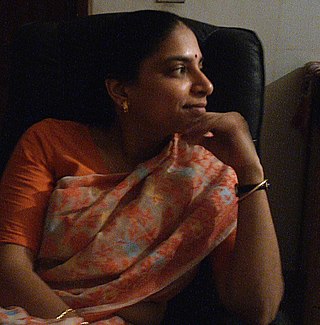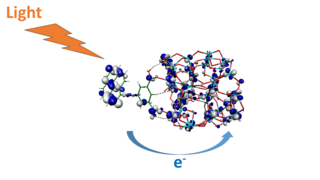Related Research Articles

St. Joseph's College, Tiruchirappalli (SJC) is a Catholic college in Tiruchirappalli, Tamil Nadu, India. It was established in 1844 by the Society of Jesus (Jesuits) and it is regarded as one of the most prestigious institutions in India. It is currently an affiliated first-grade college of Bharathidasan University.

Indian Institute of Technology Madras is a public technical university located in Chennai, Tamil Nadu, India. It is one of the eight public Institutes of Eminence of India. As one of the Indian Institutes of Technology (IITs), IIT Madras is also recognized as an Institute of National Importance.
Ashok Jhunjhunwala is an Indian academic and innovator. He received his B.Tech. from the Indian Institute of Technology, Kanpur and PhD from the University of Maine. He has been a faculty member at the Indian Institute of Technology Madras since 1981. He is the President of IIT Madras Research Park and Chairman of International Institute of Information Technology, Hyderabad. During his career, he has contributed extensively to technology innovation and adoption in the Indian context.
Chennai is home to many educational and research institutions. IIT Madras, located in South Chennai is considered as the premier centre of engineering education in India. Anna University and the University of Madras are the oldest state owned universities which are ranked among the best universities in India. The College of Engineering, Guindy and Madras Institute of Technology, which are the constituent college of Anna University along with Alagappa College of Technology are the pioneer institutes of engineering education in India. Some of the oldest medical colleges India, the Madras Medical College (1835) and Stanley Medical College (1938) are located in the city. Notable, liberal arts colleges in the city include Loyola College, Madras Christian College, Presidency College, Stella Maris College, Women's Christian College and Ethiraj College for Women.

Thalappil Pradeep is an institute professor and professor of chemistry in the Department of Chemistry at the Indian Institute of Technology Madras. He is also the Deepak Parekh Chair Professor. In 2020 he received the Padma Shri award for his distinguished work in the field of Science and Technology. He has received the Nikkei Asia Prize (2020), The World Academy of Sciences (TWAS) prize (2018), and the Shanti Swarup Bhatnagar Prize for Science and Technology in 2008 by Council of Scientific and Industrial Research.

Indian Institute of Technology Patna is a public research university and technical institute located at Bihta near Patna, Bihar. It is recognized as an Institute of National Importance by the Government of India. It is one of the second generation IITs established by an Act of the Indian Parliament on August 6, 2008.

Charusita Chakravarty was an Indian academic and scientist. She was a professor of chemistry at the Indian Institute of Technology, Delhi since 1999. In 2009 she was conferred Shanti Swarup Bhatnagar Prize for Science and Technology in the field of chemical science. In 1999, she received B.M. Birla Science Award. She was an Associate Member of the Centre for Computational Material Science, Jawaharlal Nehru Centre for Advanced Scientific Research, Bangalore.
Bhaskar Ramamurthi is an Indian academic who served as the director of Indian Institute of Technology Madras from 2011 to 2022. He succeeded M. S. Ananth and was succeeded by Prof. Kamakoti Veezhinathan.

Sivanandi Rajadurai aka Mylaudy Dr. S. Rajadurai is a scientist in the field of catalysis, physical chemistry, and emission control, focused on protection of the global environment and is a corporate executive. He is chairman of the Rajadurai Foundation.

Quantum photoelectrochemistry is the investigation of the quantum mechanical nature of photoelectrochemistry, the subfield of study within physical chemistry concerned with the interaction of light with electrochemical systems, typically through the application of quantum chemical calculations. Quantum photoelectrochemistry provides an expansion of quantum electrochemistry to processes involving also the interaction with light (photons). It therefore also includes essential elements of photochemistry. Key aspects of quantum photoelectrochemistry are calculations of optical excitations, photoinduced electron and energy transfer processes, excited state evolution, as well as interfacial charge separation and charge transport in nanoscale energy conversion systems.
Chandrasekaran Pandurangan is a computer scientist and academic professor of the Computer Science and Engineering Department at Indian Institute of Technology - Madras (IITM). He mainly focuses on the design of pragmatic algorithms, graph theory and cryptography.

Budaraju Srinivasa Murty is an Indian metallurgical engineer. He was awarded the Shanti Swarup Bhatnagar Prize for Science and Technology, the highest science award in India, for the year 2007 in engineering science category. From August 2019 he serves as the Director of Indian Institute of Technology Hyderabad. and IIIT Raichur. Prior to that he was head of department at Indian Institute of Technology Madras and professor at Indian Institute of Technology Kharagpur.
Sanjib Senapati is an Indian biophysicist, biochemist, biotechnologist and a professor at the Bhupat and Jyoti Mehta School of Biosciences, Department of Biotechnology of the Indian Institute of Technology Madras. He is known for his studies in the fields of protein dynamics, green chemistry and nanoclusters and is a Fulbright scholar. The Department of Biotechnology of the Government of India awarded him the National Bioscience Award for Career Development, one of the highest Indian science awards, for his contributions to biosciences, in 2015.
Suresh Kumar Rayala is an Indian cancer biologist and a professor at the department of biotechnology of the Indian Institute of Technology Madras. Known for his molecular and mechanistic studies of oncogenes and tumor suppressor genes, Rayala is a recipient of the Young Scientist Award of the Academy of Sciences, Chennai. The Department of Biotechnology of the Government of India awarded him the National Bioscience Award for Career Development, one of the highest Indian science awards, for his contributions to biosciences, in 2017–18.
Sarit Kumar Das is an Institute professor of the department of mechanical engineering at IIT Madras. He also held the position of Dean at Indian Institute of Technology Madras. He was the Director at IIT Ropar. His research varies from a wide range of Heat transfer applications like nanofluids, biological heat transfer microfluidics and nanoparticle mediated drug delivery in cancer cells. He is an elected fellow of National Academy of Sciences, India (NASI) and Indian National Academy of Engineering (FNAE).

Sudhhasatwa Basu is an Indian chemical engineer. He is director of Council of Scientific Industrial Research - Institute of Minerals and Materials Technology (CSIR-IMMT) in Bhubaneswar, India, and is Professor of Chemical Engineering, Indian Institute of Technology (IIT) Delhi, Adjunct Professor, Institute of Chemical Technology, Mumbai and Professor of AcSIR. His research interests include electrokinetic and electrochemical phenomena in fuel cells.
P. B. Sunil Kumar is an Indian physicist, professor and the founding director of IIT Palakkad. He also holds professorship(on lien) at Department of Physics, IIT Madras. He is known for his research on Soft matter and Biological Physics. He is an elected member of Kerala Science Congress.

Vivek Vijayrao Polshettiwar is an Indian chemist who is a professor of chemistry at the Tata Institute of Fundamental Research. He was awarded the International Union of Pure and Applied Chemistry prize for Green Chemistry in 2022. He was the winner of the prestigious Falling Walls Prize in the Physical Sciences category.

J.W. "Hans" Niemantsverdriet is a Dutch experimental physical chemist, surface scientist, author, and academic. He is a Professor Emeritus of Physical Chemistry of Surfaces at the Eindhoven University of Technology in the Netherlands and an Honorary Distinguished Professor at the Cardiff Catalysis Institute of Cardiff University.
References
- 1 2 "prof bv viswanathan". chem.iitm.ac.in. Archived from the original on 28 November 2016. Retrieved 8 January 2017.
- ↑ "First woman Financial Commissioner of Railways dead". The Hindu. 2 November 2012. Retrieved 9 January 2019.
- ↑ "National Centre for Catalysis Research :: About Us". nccr.iitm.ac.in. Retrieved 8 January 2017.
- ↑ "B.Viswanathan's Page". catalysis.chem.iitm.ac.in. Retrieved 8 January 2017.
- ↑ "Balasubramanian Viswanathan - Google Scholar Citations" . Retrieved 8 January 2017.
- ↑ "Venkat Viswanathan-Mechanical Engineering - Carnegie Mellon University". cmu.edu. Retrieved 8 January 2017.
- ↑ Viswanathan, B. (2016). Energy Sources: Fundamentals of Chemical Conversion Processes and Applications. Elsevier Science. p. 27. ISBN 9780444563606 . Retrieved 8 January 2017.
- ↑ Viswanathan, Balasubramanian; Subramanian, Vaidyanathan (Ravi); Lee, Jae Sung (23 August 2016). Materials and Processes for Solar Fuel Production. ISBN 978-1493945702.
- ↑ Viswanathan, B.; Aulice Scibioh, M. (2014). Photoelectrochemistry: Principles and Practices: B. Viswanathan, M. Aulice Scibioh: 9781842657126: Amazon.com: Books. ISBN 978-1842657126.
- ↑ Lakhi, Kripal S.; Viswanathan, B. (15 November 2013). Chemical Engineering: A Comprehensive Approach. ISBN 978-1842657560.
- ↑ Viswanathan, B.; Kannan, S.; Deka, R. C. (2010). Catalysts And Surfaces: Characterization Techniques: B. Viswanathan, S. Kannan, R. c. Deka: 9781842653159: Amazon.com: Books. ISBN 978-1842653159.
- ↑ Chakrabarty, D. K.; Viswanathan, B. (2009). Heterogeneous Catalysis. ISBN 978-1906574093.
- ↑ Viswanathan, B.; Aulice Scibioh, M. (2007). Fuel Cells: Principles and Applications. ISBN 978-1420060287.
- ↑ Viswanathan, B.; Sivasanker, S.; Ramaswamy, A.V. (2002). Catalysis: Principles and Applications. Narosa Publishing House. ISBN 9788173193750 . Retrieved 8 January 2017.
- ↑ Narayan, R.; Viswanathan, B. (1998). Chemical And Electrochemical Energy Systems. Universities Press (India) Pvt. Limited. ISBN 9788173710698 . Retrieved 8 January 2017.